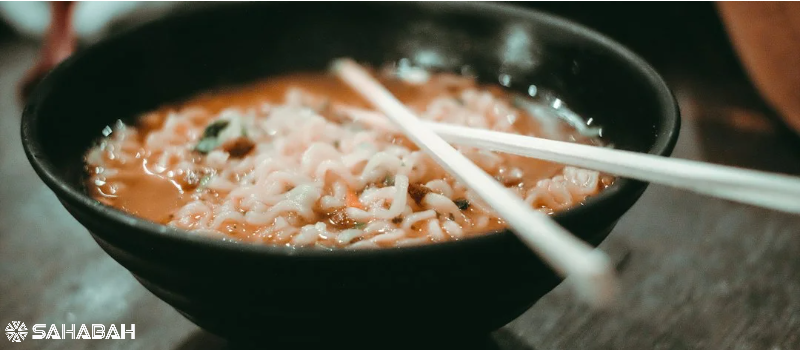Samyang has become an incredibly popular ramen noodle brand known for its spicy and flavorful instant noodles. However, many Muslims wonder whether Samyang products are certified halal. This article will examine if Samyang noodles, snacks and sauces are halal.
What Does Halal Mean?
Halal is an Arabic word that in Islam means permissible or lawful. For a food to be considered halal, it must comply with Islamic dietary restrictions as described in the Quran. This means halal foods cannot contain:
- Pork or pork by-products
- Alcohol
- Meat that was not slaughtered and prepared according to zabiha rules
The zabiha method requires the animal be slaughtered by a Muslim, who invokes Allah’s name before killing it with a sharp knife. This method of slaughter is believed to minimize the animal’s suffering.
For a product to be certified halal, it goes through an extensive inspection and audit process by an accredited halal certification body like The Korean Muslim Federation (KMF) or JAKIM in Malaysia. This oversight ensures the food is sourced, prepared and processed according to Islamic law and does not contain any non-halal ingredients.
Many devout Muslims closely follow these halal dietary restrictions as part of their faith to honor Allah. Consuming food that does not meet halal requirements would be considered haram (forbidden).
Are Samyang Noodles Halal Certified?
Samyang Foods is a popular Korean ramen and snack food company best known for its hot and spicy ramen flavors. Their best-selling product is the Samyang Buldak Bokkeummyun (Hot Chicken Flavor Ramen).
The Samyang noodles ingredients tend to be quite simple. They primarily consist of:
- Wheat flour noodles
- Vegetable oil
- Gochujang chili paste or other spice mix
- Salt
- Sweetener
- Dried vegetable or soup powder
Most Samyang noodles flavors would be considered halal as they don’t contain pork, alcohol or other clearly forbidden ingredients. However, Samyang ramen is not officially certified halal by Korean or international certification bodies.
Some flavors do also contain processed seafood products which would make them unacceptable for Muslims to eat:
- Seafood Flavor – contains fish powder
- Kimchi Flavor – contains oyster and shellfish sauce powder
So in summary – the classic Samyang spicy chicken and most meatless flavors align with halal standards. But flavors containing seafood would not qualify as halal.
Can Muslims Eat Samyang Noodles?
As Samyang does not have halal certification, whether or not Muslims can consume their products depends on personal interpretation and research of the ingredients.
More conservative followers would avoid all Samyang items given the lack of formal halal approval.
But many modern Muslims are comfortable enjoying Samyang after:
- Checking the noodle flavors do not contain seafood, meat byproducts or alcohol
- Verifying preparation methods meet general halal principles
This allows them to enjoy the popular hot chicken and cheese flavors that otherwise follow Islamic dietary guidelines.
Other Samyang Brand Products – Sauces, Snacks, Rice Cakes
Beyond noodles, Korea’s Samyang Foods produces a wide range of products like:
- Buldak Hot Chicken Sauces
- Steamy Chicken Sauces
- Fried Shrimp Chips
- Hot Chicken Rice Cakes
The halal status can vary quite significantly across these different items. For example:
- The Buldak Hot Chicken Sauce line does not seem to be halal certified, but also does not contain banned ingredients
- Select Steamy Chicken Sauces are halal certified in Indonesia and Malaysia. But limited information for other countries.
- The rice cakes and shrimp chips are more likely to contain non-halal elements
So Muslims would need to carefully inspect the ingredients label on each product when purchasing these other Samyang Food items rather than assuming all products from this brand are halal friendly.
Availability of Halal Samyang Products
While Samyang Foods as a whole does not have blanket halal certification, some of their individual products have been certified halal for select Asian markets:
Countries Where Some Halal Samyang Products Are Sold:
- Indonesia
- Malaysia
- Singapore
- Brunei
- Bangladesh (select products)
However there is still minimal availability of halal approved Samyang items in Europe, Australia or North America.
Though plain noodle flavors may technically still be permissible for Muslims living in non-Muslim majority countries like the USA, provided they thoroughly check the ingredients beforehand.
Are Samyang Noodles Vegetarian or Vegan?
Some Muslims explore vegetarian or vegan options for halal ramen that avoids any animal derived ingredients.
To be vegetarian indicates not eating any meat or meat by-products. Vegans take this further by avoiding any food linked to animals – including eggs, dairy and even honey in some cases.
The good news is Samyang does offers some vegetarian and even vegan friendly flavors such as:
Vegetarian Samyang Noodle Flavors:
- Cheese Flavor – Uses artificial cheesy flavors instead of actual cheese
- Veggie Flavor – No meat or meat flavors included
Potentially Vegan Samyang Flavors:
- Original Flavor – No obvious animal ingredients if avoid dried egg topping packet
So these options allow Muslims (as well as Hindus, Buddhists etc) that eat no meat at all for religious, ethical or health reasons to still enjoy some Samyang ramen choices.
Are Other Korea Instant Ramen Brands Halal?
Samyang is likely the most popular Korean ramen brand globally. But Korea does produce many other instant ramen products.
Some examples of other Korean ramen noodle brands include:
- Nongshim – Maker of Shin Ramyun noodles
- Ottogi – Leading food company in Korea
- Paldo – Oldest ramen brand in Korea – founded in 1963
Of these other major Korean ramen producers, only selected Nongshim Shin Ramyun products seem to have secured halal certification internationally in countries like Singapore and Malaysia.
So Muslims should not assume all Korean ramen is halal friendly. Each brand and flavor needs to be investigated separately.
Final Verdict – Is Samyang Halal?
In summary, while Samyang Foods does not have universal halal certification, many of their ramen, sauce and snack products would still be permissible for Muslims living in Asia and the West – provided they thoroughly check the ingredient panels.
Their vegetarian flavors also cater for religious devotees or vegans avoiding all animal products. With careful inspection, Muslim consumers following a halal diet can still generally enjoy Samyang’s signature spicy ramen.
Of course more observant Islamic followers may still wish to avoid all Samyang items given the current lack of formal halal approval. But for most modern Muslim consumers, popular Samyang flavors align with their religious needs after verifying preparation methods and ingredients lists.
Frequently Asked Questions: Is Samyang Halal?
Yes, Samyang Chicken Flavor Ramen Noodles are halal-certified.
What makes the Samyang Instant Ramen Noodles unique?
The Samyang Instant Ramen Noodles are known for their spicy stir-fried chicken flavor, especially popular for the hot chicken ramen variant.
Where are Samyang Instant Ramen Noodles manufactured?
Samyang Instant Ramen Noodles are manufactured in South Korea.
How many packs come in a standard Samyang Instant Ramen Noodles purchase?
A standard purchase of Samyang Instant Ramen Noodles typically includes a pack of 5 or 10 depending on the variant.
Are there different flavors of Samyang Instant Ramen Noodles available?
Yes, in addition to the spicy stir-fried chicken flavor, Samyang offers other flavors like carbonara and carbo, catering to a variety of tastes.
What is the level of spiciness of Samyang Hot Chicken Ramen noodles?
Samyang Hot Chicken Ramen noodles are known for their extreme spiciness, making them a favorite among spicy food lovers.
Can I find Samyang Instant Ramen Noodles in local supermarkets?
Yes, Samyang Instant Ramen Noodles are widely available in supermarkets, marts, and online platforms.





